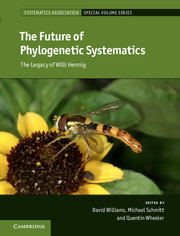
-
Select format
-
- Publisher:
- Cambridge University Press
- Publication date:
- 05 July 2016
- 21 July 2016
- ISBN:
- 9781316338797
- 9781107117648
- Dimensions:
- (246 x 189 mm)
- Weight & Pages:
- 1.23kg, 508 Pages
- Dimensions:
- Weight & Pages:
- Subjects:
- Life Sciences, Evolutionary Biology, Zoology
- Series:
- Systematics Association Special Volume Series (86)
You may already have access via personal or institutional login- Subjects:
- Life Sciences, Evolutionary Biology, Zoology
- Series:
- Systematics Association Special Volume Series (86)
Book description
Willi Hennig (1913–76), founder of phylogenetic systematics, revolutionised our understanding of the relationships among species and their natural classification. An expert on Diptera and fossil insects, Hennig's ideas were applicable to all organisms. He wrote about the science of taxonomy or systematics, refining and promoting discussion of the precise meaning of the term 'relationship', the nature of systematic evidence, and how those matters impinge on a precise understanding of monophyly, paraphyly, and polyphyly. Hennig's contributions are relevant today and are a platform for the future. This book focuses on the intellectual aspects of Hennig's work and gives dimension to the future of the subject in relation to Hennig's foundational contributions to the field of phylogenetic systematics. Suitable for graduate students and academic researchers, this book will also appeal to philosophers and historians interested in the legacy of Willi Hennig.
Contents
Metrics
Altmetric attention score
Full text views
Full text views help Loading metrics...
Loading metrics...
* Views captured on Cambridge Core between #date#. This data will be updated every 24 hours.
Usage data cannot currently be displayed.
Accessibility standard: Unknown
Why this information is here
This section outlines the accessibility features of this content - including support for screen readers, full keyboard navigation and high-contrast display options. This may not be relevant for you.
Accessibility Information
Accessibility compliance for the PDF of this book is currently unknown and may be updated in the future.


